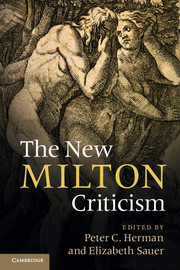Book contents
- Frontmatter
- Contents
- Notes on contributors
- Acknowledgments
- Note on editions
- Introduction Paradigms lost, paradigms found: the New Milton Criticism
- Part I Theodicies
- Part II Critical receptions
- Chapter 7 Against fescues and ferulas: personal affront and the path to individual liberty in Milton’s early prose
- Chapter 8 Disruptive partners: Milton and seventeenth-century women writers
- Chapter 9 Eve and the ironic theodicy of the New Milton Criticism
- Chapter 10 Man and thinker: Denis Saurat, and the old new Milton criticism
- Chapter 11 The poverty of context: Cambridge School History and the New Milton Criticism
- Chapter 12 Afterword
- Index
- References
Chapter 12 - Afterword
Published online by Cambridge University Press: 05 June 2012
- Frontmatter
- Contents
- Notes on contributors
- Acknowledgments
- Note on editions
- Introduction Paradigms lost, paradigms found: the New Milton Criticism
- Part I Theodicies
- Part II Critical receptions
- Chapter 7 Against fescues and ferulas: personal affront and the path to individual liberty in Milton’s early prose
- Chapter 8 Disruptive partners: Milton and seventeenth-century women writers
- Chapter 9 Eve and the ironic theodicy of the New Milton Criticism
- Chapter 10 Man and thinker: Denis Saurat, and the old new Milton criticism
- Chapter 11 The poverty of context: Cambridge School History and the New Milton Criticism
- Chapter 12 Afterword
- Index
- References
Summary
Criticism is about taking sides, … but not without forgetting there is another side, which we should be thankful for because it makes us better by contest.
Gordon TeskeyJohn Milton belongs to a special class of writers, and his last poems (especially Paradise Lost) belong to a singular category of works, whose grounds, as Louis Menand attests, “have entirely eroded”; and yet, ironically, “we can no longer understand the way things are without taking [such works] into account.” If, as Menand writes, their “afterlife is in certain respects more impressive than [their] life,” it is because such works, written with the hope that the world will not willingly let them die, cannot (as Menand quips) “be killed.” They just will not go away and, often born of controversy, continue to engender controversy. In Milton’s case, the argument is over whether Milton is a poet “obedient of submission” or of “subversive mutiny.”
If there seem to be two Miltons, in the last poems there also seem to be two different poems circulating at once – poem and counter-poem, “the official one,” as Balachandra Rajan would have it, and “the true poem … overthrow[ing] the establishment exercise.” The salient feature of Milton’s last poems is their propensity for reconsidering, then revising themselves. As Edward Phillips reports, Milton initially cast Paradise Lost as a tragedy, and thereupon turned the poem into an epic in ten, and then twelve books. The poem’s unstable genre matches its shifting structure, its moving center, as further demonstrated by Milton’s admission on the title page to the poem’s second edition (1674) that the text has been “Revised and Augmented” (3). Later issues of the 1667 Paradise Lost contain supplementary materials: a printer’s note to the reader, the poet’s note on why his poem rhymes not, arguments first printed seriatim and, starting in 1674, appended to individual books of the poem. The arguments themselves are in a sometimes asymmetrical relationship with the books they accompany and, on the issue of whether God drives Satan from Heaven or whether Satan hurls himself, contradict each other. Dedicatory poems supplement the second edition of Paradise Lost, shifting contexts and issuing competing directives for reading the poem.
- Type
- Chapter
- Information
- The New Milton Criticism , pp. 231 - 248Publisher: Cambridge University PressPrint publication year: 2012
References
- 1
- Cited by



